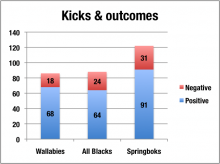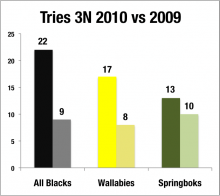Scheduled Website Maintenance
We’re currently in the process of moving to a new and improved server environment. During this transition, the website may experience brief interruptions or temporary outages.
We appreciate your patience while we complete this upgrade. Service will return to normal shortly, with improved performance and reliability.
Thank you for your understanding.
Only a year ago the Springboks appeared invincible. I wrote 2010 resolution: beat the Saffa gameplan in which I asked just how could the rest of the world cope with their extreme game-plan of possession avoidance. How the world has turned.
Less than 12 months later and even some of the most patriotic of Springbok supporters are in the depths of despair. The coach and the team are ‘washed up’ and heads need to roll. They’re all but discounted as contenders for the World Cup and yet again the All Blacks are shoo-ins to take Bill.
Has world rugby really changed that much? Are the Springboks really a spent force? My answers are yes and no.
 South Africa’s 2009 success was based on the application of an extreme game-plan through the world leading skills of 4 key players against a unique set of law interpretations. Victor won the line-out, Fourie put in an inch perfect box-kick, Heinrick used the interpretations that favoured the kick-chase to generate a penalty and Morne slotted 90% plus of those goals.
South Africa’s 2009 success was based on the application of an extreme game-plan through the world leading skills of 4 key players against a unique set of law interpretations. Victor won the line-out, Fourie put in an inch perfect box-kick, Heinrick used the interpretations that favoured the kick-chase to generate a penalty and Morne slotted 90% plus of those goals.
This season, South Africa has been without two of those four lynch-pin players in Brussow and Du Preez. So, even if rugby had stayed the same this year, their ability to enforce this gameplan would have been greatly diminished.
However, undeniably the game has moved on in response to the new ruck interpretations and the Springboks have not moved as quickly. As recently released IRB statistics show, the average ruck/maul count is up 35%, and the average number of kicks out of hand were down almost 40% per game in the 2010 vs the 2009 Tri-Nations.
 Of the three teams though, the Springboks made the fewest ball carries and kicked away the greatest percentage of possession. Unlike last year, belting the ball downfield wouldn’t see it coming straight back. The average number of kicks with no meaningful chase fell from 23 per game in 2009 (up North it was 28), to just 11 this year.
Of the three teams though, the Springboks made the fewest ball carries and kicked away the greatest percentage of possession. Unlike last year, belting the ball downfield wouldn’t see it coming straight back. The average number of kicks with no meaningful chase fell from 23 per game in 2009 (up North it was 28), to just 11 this year.
With possession so valuable, the absence of Brussow became a double blow. When playing Australia or New Zealand in the 2010 Tri-Nations, between 16% and 18% (respectively) of your possession would be stolen at the breakdown. When playing South Africa it was only 8%.
 As Austin alluded to in a previous post, this all resulted in a new paradigm for point scoring in the Tri-Nations. Overall, the ratio of penalty goals to tries in 2009 was 2.6 to 1, in 2010 that fell to 1.1 to 1.
As Austin alluded to in a previous post, this all resulted in a new paradigm for point scoring in the Tri-Nations. Overall, the ratio of penalty goals to tries in 2009 was 2.6 to 1, in 2010 that fell to 1.1 to 1.
Digging within this ratio though, for the champion team (NZ) only 26% of their points came from penalty goals. For the second placed team it was 31%. For the Springboks, it was 41%. Tries, not penalty goals were the currency this year, and South Africa scored the fewest.
So, being on the wrong end of all of these indicators so far, are the Springboks dead and buried for 2011?
I believe categorically not. In retrospect, moving from such a extreme gameplan – where they set new records for the fewest passes made in a test match – to the complete opposite was never going to happen in one season. An evolution of strategy and selection policy within the most capped Springbok squad of all time will see strong improvement.
And it’s not as if this experience comes at the cost of staying power on the pitch. Of all three teams, only the Springboks averaged more points in the second half than they did in the first in the 2010 Tri-Nations. They also had the biggest differential in being able to keep points out. Hardly washed out.
But of all of the factors that could reverse South Africa’s fortunes, I believe it’s the one that I most underestimated just a year ago; the application of the laws. In one short year we’ve gone to a complete reversal of advantage between attack and defence, possession and territory. Characteristically introduced in almost completely ad hoc way by the IRB.
Twelve months down the line, who can say what will happen? A cynic might think that, much the way of the ELVs, certain Northern Hemisphere parties might not be quite so keen on these new nuances after a sampling over this winter. We’ve also already seen wide vagaries in application of interpretation between referees.
Come the pressure of finals football at the World Cup, just how expansive will the game be? If history tells us anything – not very. In such situations, the Fourie, Morne, Victor and Heinrich stocks will be back in vogue.
Yes, a year’s a long time in rugby, and we’ve got another one to go.
